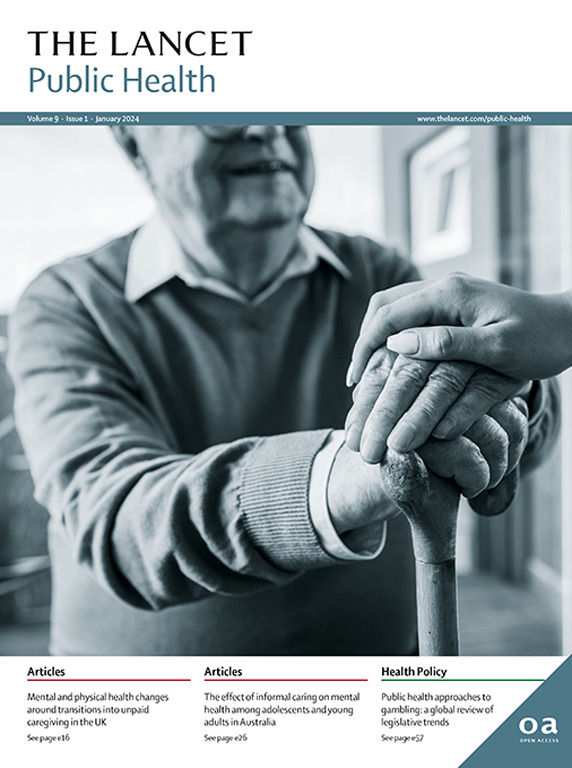Estimated health impact, cost, and cost-effectiveness of taxation on unhealthy packaged foods in the Philippines: a modelling study
IF 25.2
1区 医学
Q1 PUBLIC, ENVIRONMENTAL & OCCUPATIONAL HEALTH
引用次数: 0
Abstract
Background
In 2018, the Philippines implemented a tax on sugar-sweetened beverages. A broader tax on unhealthy foods is being considered. We aimed to estimate the effect of a tax on unhealthy packaged foods.Methods
In this modelling study, we used a multiple-cohort, proportional multistate life table model to estimate the effect of a 20% tax on packaged foods exceeding WHO thresholds for sodium or sugar, excluding beverages already taxed. Using nationally representative nutrition, sales, and Global Burden of Diseases, Injuries, and Risk Factors Study data, we projected changes in sodium and sugar intake and related health outcomes (cardiovascular disease and type 2 diabetes) and economic outcomes (health-care costs, tax revenue, and implementation costs) over 20 years, comparing Filipino adults aged 25 years and older in 2020 (reference population) with the same population under the intervention with reduced intakes from the tax, assuming 100% pass-through to prices. Cost-effectiveness was estimated from extended health-care and government perspectives and stratified by wealth quintile.Findings
Compared with the base-case scenario (ie, the status quo), the tax was estimated to avert 2775 deaths (95% uncertainty interval 2685–2853), 13 632 incident ischaemic heart disease events (13 153–14 029), 5287 ischaemic strokes (5090–5445), and 21 763 type 2 diabetes cases (21 532–22 006) over 20 years, generating 326 253 health-adjusted life-years (321 577–330 434). The tax could be cost saving from the government perspective and cost-effective from the health-care perspective, with an estimated 2·37 billion Philippine pesos (PHP; 2·32–2·42) in health-care savings, PHP 647·99 billion (646·42–649·45) in tax revenue, and PHP 12·96 billion (12·93–12·99) in implementation costs over 20 years. Estimated health gains were concentrated among people in middle-income groups, whereas tax revenue increased with income.Interpretation
A nutrient-based tax on unhealthy packaged foods could reduce diet-related disease burden and generate sustained tax revenue in the Philippines. These findings support nutrient-based food taxes as a cost-effective strategy to reduce disease burden, and raise revenue in low-income and middle-income countries.Funding
Resolve to Save Lives funded by Bloomberg Philanthropies.菲律宾对不健康包装食品征税的估计健康影响、成本和成本效益:一项模型研究
2018年,菲律宾对含糖饮料征税。政府正在考虑对不健康食品征收更广泛的税。我们的目的是估计对不健康包装食品征税的影响。在这项建模研究中,我们使用了一个多队列、比例多状态生命表模型来估计对钠或糖含量超过世卫组织阈值的包装食品征收20%税的影响,不包括已经征税的饮料。利用具有全国代表性的营养、销售和全球疾病、伤害和风险因素负担研究数据,我们预测了20年来钠和糖摄入量以及相关健康结果(心血管疾病和2型糖尿病)和经济结果(医疗保健成本、税收收入和实施成本)的变化。将2020年25岁及以上的菲律宾成年人(参考人口)与在税收减少的干预下的相同人口进行比较,假设100%转嫁到价格上。从广泛的保健和政府角度估计了成本效益,并按财富五分位数分层。与基本情况(即现状)相比,该税估计在20年内避免了2775例死亡(95%不确定区间为2685-2853),13632例缺血性心脏病事件(13153 - 14029),5287例缺血性中风(5090-5445)和21763例2型糖尿病(21532 - 22006),产生326253个健康调整生命年(321 577-330 434)。从政府的角度来看,该税可以节省成本,从保健的角度来看,它具有成本效益,在20年的时间里,估计可节省2.37亿菲律宾比索(2.32 - 2.42)的保健费用,647.99亿菲律宾比索(646.42 - 649.45)的税收收入,以及129.6亿菲律宾比索(12.93 - 12.99)的实施费用。估计的健康收益集中在中等收入群体中,而税收则随着收入的增加而增加。在菲律宾,对不健康包装食品征收营养税可以减少与饮食有关的疾病负担,并产生持续的税收。这些发现支持以营养为基础的食品税作为一种具有成本效益的战略,以减轻低收入和中等收入国家的疾病负担并增加收入。由彭博慈善基金会资助的“拯救生命的决心”。
本文章由计算机程序翻译,如有差异,请以英文原文为准。
求助全文
约1分钟内获得全文
求助全文
来源期刊

Lancet Public Health
Medicine-Public Health, Environmental and Occupational Health
CiteScore
55.60
自引率
0.80%
发文量
305
审稿时长
8 weeks
期刊介绍:
The Lancet Public Health is committed to tackling the most pressing issues across all aspects of public health. We have a strong commitment to using science to improve health equity and social justice. In line with the values and vision of The Lancet, we take a broad and inclusive approach to public health and are interested in interdisciplinary research.
We publish a range of content types that can advance public health policies and outcomes. These include Articles, Review, Comment, and Correspondence. Learn more about the types of papers we publish.
 求助内容:
求助内容: 应助结果提醒方式:
应助结果提醒方式:


